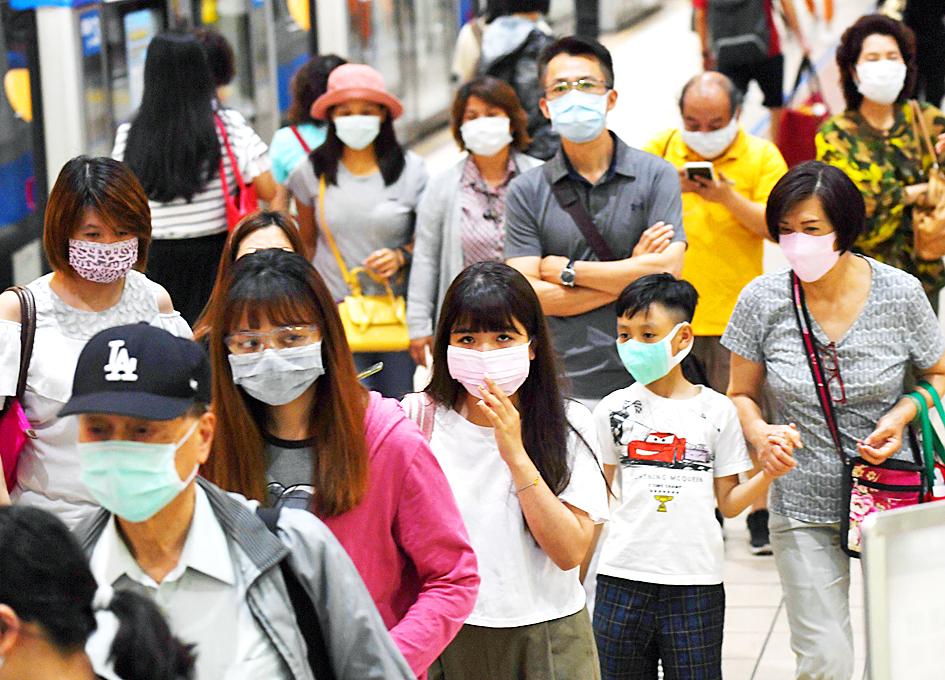People using Taipei’s MRT metropolitan railway network and public bus system would no longer be required to wear masks at all times when in stations, metro cars or buses from tomorrow, Taipei Deputy Mayor Vivian Huang (黃珊珊) announced yesterday.
The mask requirement on public transport in Taipei is being eased on the same day the central government plans to relax disease prevention measures on trains and domestic flights, as there have been no domestic COVID-19 infections in nearly two months, she said.
“As long as social distancing can be maintained,” passengers riding the MRT and public buses in the city can remove their masks while at stations, in metro cars or buses, but would still be required to wear masks when entering a station or boarding a bus, she added.

Photo: CNA
Metro and bus drivers, as well as station personnel, would still be required to have their temperature checked and wear masks when on duty, the Taipei Public Transportation Office said.
Wearing masks remains obligatory for passengers who have a fever or respiratory symptoms, it said.
Separately yesterday, New Taipei City Department of Transportation Director Chung Ming-shih (鍾鳴時) said that the easing of the mask requirement would be simultaneously implemented in New Taipei City, Keelung and Taoyuan to form a “zone defense” against the novel coronavirus.
The Ministry of Transportation and Communications has said that it plans to relax disease prevention measures on trains and domestic flights from tomorrow, as the spread of COVID-19 has eased in Taiwan.
Passengers on Taiwan Railways Administration (TRA) and Taiwan High Speed Rail Corp (THSRC) trains would still have their temperature checked at the ticket barrier and be required to wear a mask, but can remove the mask afterward if certain conditions are met, it said.
Those conditions include observing proper social distancing, the ministry added.
Tomorrow has been chosen as the date for the relaxed provisions to be introduced because if there are no new domestic COVID-19 infections by then, it would be 56 days without any such cases — four 14-day incubation periods for the disease.
After the restrictions are eased, passengers would be allowed to eat on trains and domestic flights as long as social distancing is observed or neighboring passengers are wearing masks, the ministry said.
The TRA and THSRC yesterday said that they would resume serving food on their trains from tomorrow.
Passengers would be able to purchase boxed meals and packaged snacks, as well as use vending machines on the trains wherever they are available, they said.
However, passengers can only consume food if social distancing is observed, meaning that they must remain at least 1.5m from other people or passengers near them must wear masks, they added.

The CIA has a message for Chinese government officials worried about their place in Chinese President Xi Jinping’s (習近平) government: Come work with us. The agency released two Mandarin-language videos on social media on Thursday inviting disgruntled officials to contact the CIA. The recruitment videos posted on YouTube and X racked up more than 5 million views combined in their first day. The outreach comes as CIA Director John Ratcliffe has vowed to boost the agency’s use of intelligence from human sources and its focus on China, which has recently targeted US officials with its own espionage operations. The videos are “aimed at

STEADFAST FRIEND: The bills encourage increased Taiwan-US engagement and address China’s distortion of UN Resolution 2758 to isolate Taiwan internationally The Presidential Office yesterday thanked the US House of Representatives for unanimously passing two Taiwan-related bills highlighting its solid support for Taiwan’s democracy and global participation, and for deepening bilateral relations. One of the bills, the Taiwan Assurance Implementation Act, requires the US Department of State to periodically review its guidelines for engagement with Taiwan, and report to the US Congress on the guidelines and plans to lift self-imposed limitations on US-Taiwan engagement. The other bill is the Taiwan International Solidarity Act, which clarifies that UN Resolution 2758 does not address the issue of the representation of Taiwan or its people in

US Indo-Pacific Commander Admiral Samuel Paparo on Friday expressed concern over the rate at which China is diversifying its military exercises, the Financial Times (FT) reported on Saturday. “The rates of change on the depth and breadth of their exercises is the one non-linear effect that I’ve seen in the last year that wakes me up at night or keeps me up at night,” Paparo was quoted by FT as saying while attending the annual Sedona Forum at the McCain Institute in Arizona. Paparo also expressed concern over the speed with which China was expanding its military. While the US

SHIFT: Taiwan’s better-than-expected first-quarter GDP and signs of weakness in the US have driven global capital back to emerging markets, the central bank head said The central bank yesterday blamed market speculation for the steep rise in the local currency, and urged exporters and financial institutions to stay calm and stop panic sell-offs to avoid hurting their own profitability. The nation’s top monetary policymaker said that it would step in, if necessary, to maintain order and stability in the foreign exchange market. The remarks came as the NT dollar yesterday closed up NT$0.919 to NT$30.145 against the US dollar in Taipei trading, after rising as high as NT$29.59 in intraday trading. The local currency has surged 5.85 percent against the greenback over the past two sessions, central